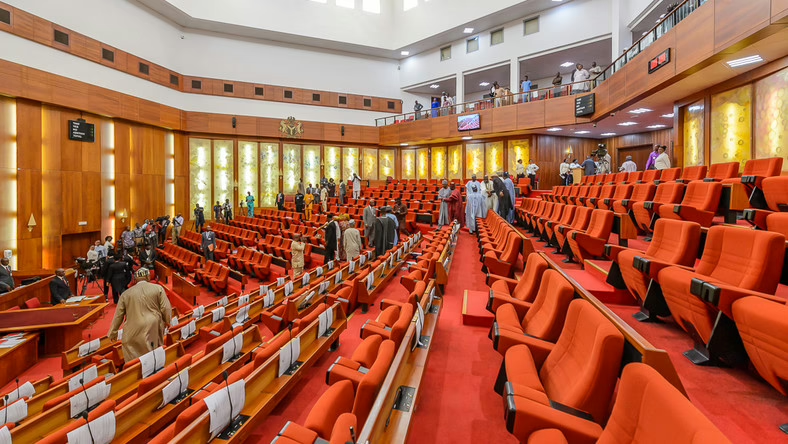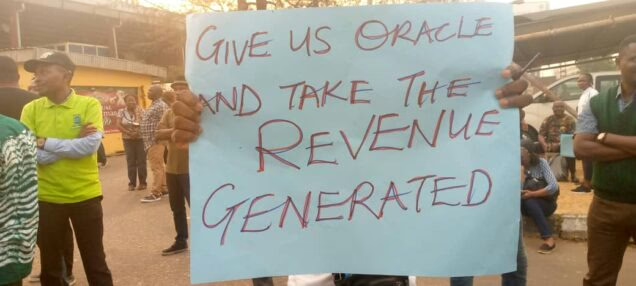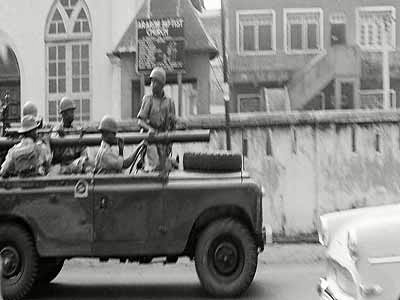can never get worse than it is already for internally displaced persons at the Muna Internally Displaced Persons camp in Maiduguri, Borno State.
On Wednesday, November 15, like a thief in the night, fire stealthily ravaged the camp, scorching everything in its path, leaving in its trail unfathomable losses and deaths.
One person whose grief runs deep and is still embroiled in deep mourning after the smoke settles is Alhaji Lawan.
With the little willpower left, he composed himself to recount how the fire ferociously licked through the camp, claiming the life of his loved one and that of others displaced by insurgency and who had made the place their home.
Amid the struggle to suppress the grief and appear manly, it was obvious that his emotions were at the seams, waiting to burst like a dam.
He narrated all that happened in a fairly croaky voice, revealing that the fire claimed the life of his ebullient nephew, Abubakar, who was soundly asleep at the time.
The two-year-old, learnt, was one of the two children, whose charred remains were evacuated after the inferno was extinguished.
It was, however, learnt that fire is no stranger to the camp as it usually occurs annually, at the beginning of the Harmattan season.
And any time this happens, a large number of the mainly thatched houses, aided by the dry, cold wind, would get razed, forcing a huge number of the IDPs to sleep for days in open spaces.
Some are also forced to take refuge in nearby host communities or uncompleted public properties within the Maiduguri metropolis.
The camp, which originally used to be populated mainly by IDPs from Mafa, Matte, Dikwa and Gamboru-Ngala LGAs, is now also occupied by substantial numbers from Bama and Gwoza, as well as returnees, who find it difficult to stay at their ancestral homes where they were relocated following the closure of all official camps by the Borno State Government.
The Wednesday fire, gathered, was caused by a flame that blew from a local cooking stove used by a female IDP to cook in one of the thatched houses between 10 am and 11 am.
Although earlier sources said about 1,120 houses were affected by the fire, the Borno State Emergency Management Agency listed 1,307.
It noted that ordinarily, every IDP household should, by official standard, contain nine persons, but the majority of the households at the Muna camp have no fewer than 12 persons.
A day after the fire incident, the IDPs at the camp regaled sympathisers with sorry details of what happened as they rummaged through burnt remains, picking what was left of their belongings that were not completely seared by the fire.
All over the IDP camp, women and children looked gloomy and despondent.
However, most of them who were ready to move past the incident were seen already re-erecting their thatched houses,
Recalling how his nephew, Abubakar died, Aljahi Musa said the toddler was alone at home sleeping when the flames spread to their hut.
The boy, he said, died in the most tragic way, the old man said, shaking his head in regret.
“We could only imagine later that Abubakar found himself completely trapped by the flames when he woke up. As a child, he could not make any move to either call for attention or crawl out.
“By the time the flames were doused, we only detected a heap of ashes and bones that used to be my nephew, Abubakar,” Musa said with tears in his eyes.
Continuing, he said, “We could only gather the ashes and bones in a sack and arranged for a Muslim burial for him at the Muna children’s cemetery.
“We watched helplessly as the fast-moving flame, with the help of the harmattan wind, consumed our house. We were confused and completely overwhelmed by shock and scampered in different directions in search of water or anything to extinguish the flames.
“We could not save anything, not even our cooking utensils,” Abba Aji, the head of a 17-member family recalled.
The elderly man, who was bent by age, struggled with shaky hands to dig holes to insert stilts which would form the foundation for another thatched hut to house his displaced family members.
“We barely managed to save a few items. The mats we slept on were borrowed from the town, otherwise, we would have slept on the bare ground. Last night all of us slept in the open with the cold Harmattan wind blowing over us”, Aji lamented.
“My husband travelled to Dikwa and we lost everything except the clothes we are wearing now. What we need immediately now is food items, because we don’t have a grain of rice. I slept outside with my children,” Falmata Modu, a mother of three, said, with hands folded over her bosom.
Bulama Maudubula, who is also the head of another 12-member family lamented, “My problem now is I don’t have any grain of food for the family and I don’t have a dime to buy even a roll of thatch to erect a hut for them. I need three huts for them.”
Adam Goni, who is the head of a 15-member household was sad that the Muna fire disaster has become a yearly occurrence for a couple of years now and that nothing was being done to forestall future occurrences.
“The government should either re-plan this camp properly to minimise incidences of fire disaster or close the place to save people from trauma and huge losses. We have been traumatized enough by Boko Haram, and now, by fire,” he stated.
The Deputy Governor of Borno State, Umar Kadafur, toured the burnt section of the camp when he paid a condolence visit to those who lost their loved ones.
He appealed to the IDPs to stop cooking inside the thatched huts due to its volatile nature, especially as the harmattan season had set in.
Before distributing relief materials provided by Borno SEMA as first aid, he told the IDPs that the state government would soon relocate them to their ancestral homes.
The Director-General of Borno SEMA, Dr Mohammed Barkindo, said a total of 1,307 were razed down by the fire, excluding the 60 deliberately destroyed by SEMA officials to prevent the spread of the fire to other sections of the camp.
“We are still counting and assessing the damage. The figure could be higher,” he added.










